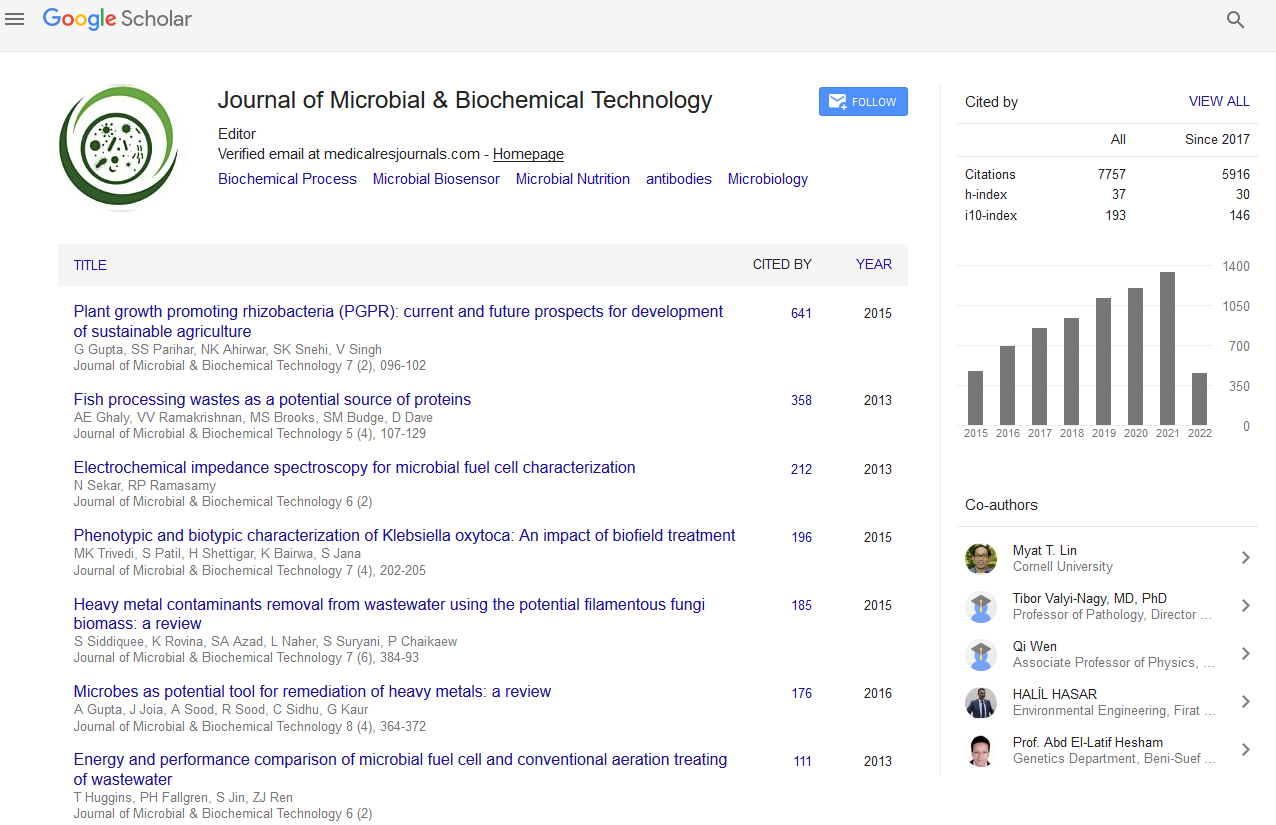PMC/PubMed Indexed Articles
Indexed In
- Academic Journals Database
- Genamics JournalSeek
- Academic Keys
- JournalTOCs
- China National Knowledge Infrastructure (CNKI)
- Scimago
- Access to Global Online Research in Agriculture (AGORA)
- Electronic Journals Library
- RefSeek
- Directory of Research Journal Indexing (DRJI)
- Hamdard University
- EBSCO A-Z
- OCLC- WorldCat
- SWB online catalog
- Virtual Library of Biology (vifabio)
- Publons
- MIAR
- University Grants Commission
- Geneva Foundation for Medical Education and Research
- Euro Pub
- Google Scholar
Useful Links
Share This Page
Journal Flyer

Open Access Journals
- Agri and Aquaculture
- Biochemistry
- Bioinformatics & Systems Biology
- Business & Management
- Chemistry
- Clinical Sciences
- Engineering
- Food & Nutrition
- General Science
- Genetics & Molecular Biology
- Immunology & Microbiology
- Medical Sciences
- Neuroscience & Psychology
- Nursing & Health Care
- Pharmaceutical Sciences
Adsorption of a thermoacidophilic peroxiredoxin of Sulfolobus solfataricus on Bacillus megaterium spores
Joint Event on 4th World Congress and Expo on Applied Microbiology & 2nd International Conference on Food Microbiology
November 29-December 01, 2017 Madrid, Spain
M Lanzilli, G A Tipaldi, G Donadio, F Fusco, D Limauro, E Ricca and R Isticato
University of Naples Federico II, Italy
Posters & Accepted Abstracts: J Microb Biochem Technol
Abstract:
Bacterial spores displaying heterologous proteins have been proposed as a safe and efficient system to deliver antigens and enzymes to animal mucosal surfaces. Initial studies have been performed using Bacillus subtilis spores but then other spore formers have been considered. B. megaterium spores have been shown able to display large amounts of a model heterologous protein that localized on the spore surface and in part infiltrated in the below layers. We used B. megaterium spores to adsorb Bcp1, a thermoacidophilic peroxiredoxin of Sulfolobus solfataricus, known to have a strong antioxidant activity. We report that purified Bcp1 was efficiently adsorbed on spores of QM B1551 localizing on the surface and underneath the exosporium. Adsorbed Bcp1 retained its enzymatic activity and was somehow protected against acidic pH values and simulated gastric or intestinal conditions. The spore outermost layer, the exosporium, was essential in allowing an efficient adsorption of Bcp1 and in protecting the adsorbed enzyme. The efficiency of the adsorption, the protection of Bcp1 activity in simulated intestinal conditions and the well-documented safety and robustness of B. megaterium spores propose the spore of this species as a valid system for the oral delivery of molecules with health beneficial properties.
Biography :
M Lanzilli received her Master’s degree in Industrial Biotechnology from the Federico II University of Naples in 2015. After that, she entered the PhD programme in Biology of the same University. She is expected to defend her PhD thesis by the end of 2018. She has a standing experience in the genetics and molecular biology of B. subtilis, in particular on spore biology and on the use of bacterial spores as vaccine vehicles. She is author of two papers that got published in 2016 and two papers are in preparation. Her participation in the funded project: 2017-2019: STAR, the project was entitled “Development of New Bio-Sensors”.


